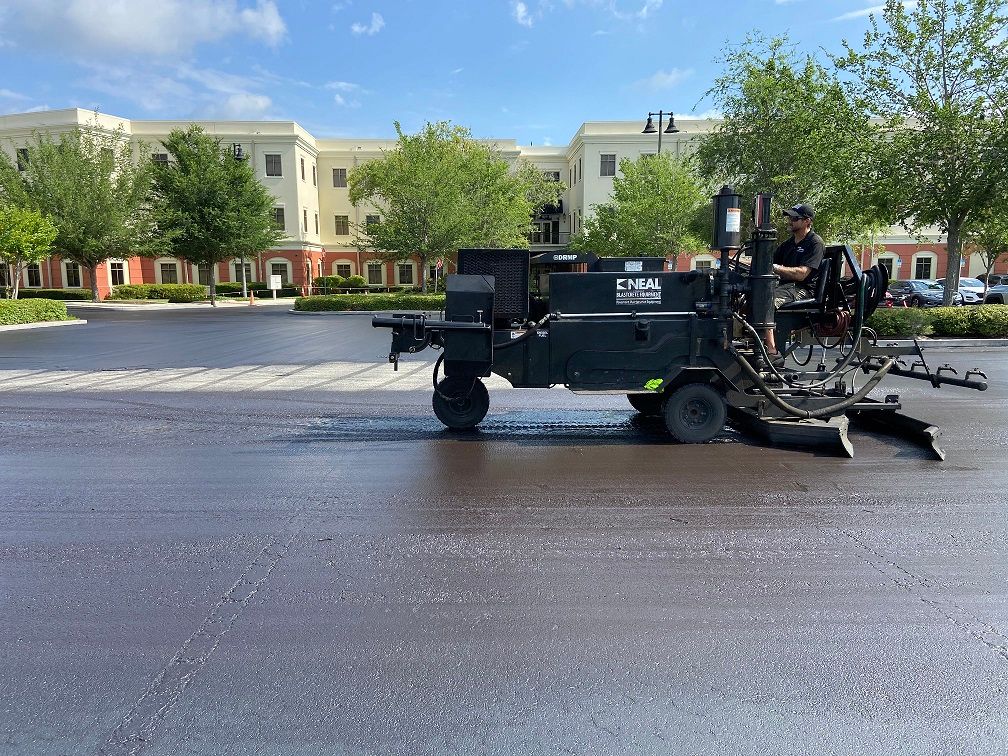

You pull into your driveway after a long day, and there it is again—that jarring bump as your car hits the pothole that's been growing larger each week. What started as a small crack in your asphalt has now become a tire-threatening crater that makes every arrival home feel like navigating an obstacle course.
Potholes aren't just minor inconveniences. They're silent destroyers of property value, safety hazards waiting to cause accidents, and expensive problems that only get worse with time. For property owners in Daytona Beach, FL, where intense heat, sudden downpours, and hurricane seasons put extra stress on asphalt surfaces, understanding the true impact of potholes is crucial for protecting both your investment and your peace of mind.
Many property owners make the costly mistake of treating potholes as cosmetic issues they can deal with "someday." However, what appears to be a simple surface problem often signals deeper structural issues that can lead to thousands of dollars in repairs if left unaddressed.
Potholes begin their destructive journey as small cracks in the asphalt surface. When water seeps into these cracks and freezes during cooler months, it expands and widens the openings. In Florida's climate, the constant cycle of heating and cooling, combined with heavy rainfall, accelerates this process significantly.
Traffic loads compound the problem. Each vehicle that passes over a weakened area of asphalt pushes down on the compromised foundation, gradually loosening the surrounding material. Over time, chunks of asphalt break away, creating the bowl-shaped depressions we recognize as potholes.
The damage doesn't stop at the surface level. Once a pothole forms, it allows water to penetrate deeper into the sub-base layers of your pavement. This water infiltration can destabilize the entire foundation, leading to more extensive cracking, settling, and structural failure that extends far beyond the original pothole location.
Potholes pose serious risks to vehicles and their occupants. A single encounter with a deep pothole can cause tire damage, wheel misalignment, suspension problems, and even undercarriage damage. For commercial properties, this creates potential liability issues if customers or employees suffer vehicle damage on your premises.
The average cost to repair pothole-related vehicle damage ranges from $300 for minor tire replacement to over $1,000 for suspension and alignment issues. Property owners who delay pothole repairs may find themselves facing insurance claims or lawsuits from affected parties.
Deteriorating asphalt surfaces significantly impact property values and curb appeal. Potential buyers, tenants, or customers form immediate negative impressions when they encounter damaged pavement. Real estate professionals consistently report that properties with well-maintained asphalt surfaces command higher prices and attract more interest than those with visible pothole damage.
For commercial properties, damaged parking lots and driveways can drive away customers who perceive the business as poorly maintained or potentially unsafe. This loss of foot traffic directly impacts revenue and long-term business success.
The most expensive consequence of ignoring potholes is the exponential increase in repair costs over time. A small crack that could be sealed for under $50 can evolve into a pothole requiring hundreds of dollars in patching. If water damage reaches the sub-base, complete section replacement costing thousands of dollars may become necessary.
Daytona Beach properties face particular challenges when it comes to asphalt maintenance. The coastal environment exposes pavement to salt air, which can accelerate the deterioration of asphalt binders. High humidity levels keep moisture in contact with pavement surfaces longer, increasing the risk of water penetration through cracks.
The area's intense summer heat causes asphalt to expand and contract more dramatically than in moderate climates. This thermal cycling creates stress on the pavement structure, making crack formation more likely. Additionally, Florida's heavy rainfall during hurricane season can quickly turn minor surface cracks into major drainage problems.
Tourism and commercial activity in the Daytona Beach area also mean that many properties experience heavy traffic loads year-round. This constant vehicle pressure accelerates wear patterns and makes prompt pothole repair even more critical for maintaining safe, functional surfaces.
While hardware stores sell cold-patch asphalt products marketed for DIY pothole repair, these temporary solutions rarely provide lasting results. Cold patches lack the durability and proper bonding characteristics of professional hot-mix asphalt applications. Most DIY repairs fail within months, requiring repeated applications that ultimately cost more than professional repair would have initially.
Professional asphalt repairs in Daytona Beach, FL involve proper surface preparation, high-quality materials, and techniques that address underlying causes of pavement failure. Experienced contractors can identify whether a pothole represents an isolated problem or symptoms of broader pavement issues that require comprehensive attention.
Professional repairs typically include cleaning and preparing the pothole area, applying tack coat for proper adhesion, installing hot-mix asphalt in appropriate lifts, and compacting the repair to match surrounding pavement density. This thorough approach ensures repairs that can last for years rather than months.
The most cost-effective approach to pothole management involves prevention through regular maintenance. Crack sealing represents the first line of defense against pothole formation. By sealing cracks promptly, property owners prevent water infiltration that leads to sub-base damage and eventual pothole development.
Sealcoating provides another layer of protection by creating a waterproof barrier over the entire asphalt surface. This treatment not only prevents water penetration but also protects against UV damage, chemical spills, and general wear from traffic. Properties that maintain regular sealcoating schedules typically experience significantly fewer pothole problems.
Regular inspections help identify potential problem areas before they become major issues. Property owners should examine their asphalt surfaces at least twice yearly, looking for signs of cracking, drainage problems, or areas where the pavement appears to be settling or becoming soft.
Certain warning signs indicate that professional intervention is necessary. Large potholes, multiple potholes in close proximity, or potholes that reappear quickly after DIY repairs all suggest underlying structural problems that require expert assessment.
If water pools around pothole areas or if the surrounding pavement shows signs of instability, the problem likely extends beyond the visible surface damage. Professional contractors can evaluate the sub-base condition and recommend appropriate repair strategies that address root causes rather than just symptoms.
Properties with high traffic volumes or where safety is a primary concern should always opt for professional repairs. The liability risks and potential for rapid deterioration make expert intervention the only responsible choice for these situations.
Potholes represent more than just cosmetic blemishes on your property's asphalt surfaces. They're warning signs of structural problems that can lead to expensive repairs, safety hazards, and decreased property values if not addressed promptly and properly.
The key to effective pothole management lies in understanding that small problems become big expenses when ignored. Proactive maintenance, professional repairs, and regular inspections provide the most cost-effective approach to preserving your asphalt investment.
If you need professional asphalt repairs in Daytona Beach, FL, contact Florida Sealcoating today to get a quote. Don't let small potholes become major problems—protect your property with expert asphalt maintenance services.
Get a free, no-obligation estimate for your asphalt project. Our team is ready to help protect and enhance your property.
(407) 942-3681